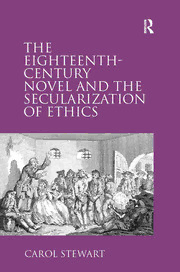
The Eighteenth-Century Novel and the Secularization of Ethics PDF
Preview The Eighteenth-Century Novel and the Secularization of Ethics
THE EIGHTEENTH-CENTURY NOVEL AND THE SECULARIZATION OF ETHICS To Stephen The Eighteenth-Century Novel and the Secularization of Ethics CAROL STEWART First published 2010 by Ashgate Publishing Published 2016 by Routledge 2 Park Square, Milton Park, Abingdon, Oxon OX14 4RN 711 Third Avenue, New York, NY 10017, USA Routledge is an imprint of the Taylor & Francis Group, an informa business Copyright © Carol Stewart 2010 Carol Stewart has asserted her right under the Copyright, Designs and Patents Act, 1988, to be identified as the author of this work. All rights reserved. No part of this book may be reprinted or reproduced or utilised in any form or by any electronic, mechanical, or other means, now known or hereafterinvented, including photocopying and recording, or in any information storage orretrieval system, without permission in writing from the publishers. Notice: Product or corporate names may be trademarks or registered trademarks, and are used only for identification and explanation without intent to infringe. British Library Cataloguing in Publication Data Stewart, Carol. The eighteenth century novel and the secularization of ethics. 1. English fiction – 18th century – History and criticism. 2. Ethics in literature. 3. Women in literature. 4. Women – Great Britain – Social conditions – 18th century. 5. Books and reading – Great Britain – History – 18th century. 6. Religion and ethics. I. Title 823.5’09353–dc22 Library of Congress Cataloging-in-Publication Data Stewart, Carol (Carol Ann) The eighteenth-century novel and the secularization of ethics / by Carol Stewart. p. cm. Includes index. ISBN 978-0-7546-6348-5 (hardback: alk. paper) 1. English fiction—18th century—History and criticism. 2. Ethics in literature. 3. Christian ethics in literature. 4. Religion and literature—England—History—18th century. 5. Latitudinarianism (Church of England)—History—18th century. I. Title. PR858.E67S74 2010 823’.509353—dc22 2009052680 ISBN 9780754663485 (hbk) Contents Acknowledgements vii Introduction 1 1 Secularizing Ethics: From Pamela to Tom Jones 33 2 Opposition and Persuasion: From Roderick Random to Humphry Clinker 71 3 Rewriting Ethics: David Simple, The Female Quixote, and Memoirs of Miss Sidney Bidulph 101 4 Tristram Shandy: Latitudinarianism and Liberty 131 5 ‘Hurtful Insignificance’?: The Novel in the Later Eighteenth Century 165 Works Cited 195 Index 211 This page has been left blank intentionally Acknowledgements This book began life as a doctoral thesis supervised by Ian Campbell Ross at Trinity College, Dublin. His consistent support for this project, from its earliest days until publication, has been invaluable. He brought rigour, scholarship and remarkable patience to his reading and re-reading of my writing, and continues to go well beyond the call of duty as a supervisor. I want to take this opportunity to record my thanks. All mistakes contained herein are, of course, my own. Parts of Chapters 1 and 5 previously appeared as ‘Pamela and the Anglican Crisis of the 1730s’, in the Journal for Eighteenth-Century Studies, 32.1 (March 2009), and ‘The Anglicanism of Tristram Shandy: Latitudinarianism at the Limits’, in the British Journal for Eighteenth-Century Studies, 28.2 (Autumn 2005). My thanks also go to Stephen Stewart, whose encouragement and faith in me have been unwavering over very many years. This book is dedicated to him. This page has been left blank intentionally Introduction Writing to a friend in April 1749, Captain Lewis Thomas recommended Henry Fielding’s recently published Tom Jones as a work of great moral efficacy, which was likely to do more good than any number of clerical homilies: ‘If my design had been to propagate virtue by appearing publickly in its defence, I should rather have been ye Author of Tom Jones than of five Folio Volumes of sermons’.1 This view was not universal. Samuel Johnson was famously shocked to hear Hannah More quote from ‘so vicious a book’. In 1750 Thomas Sherlock, Bishop of London, issued a pastoral letter on the occasion of the earthquake tremors experienced in London, warning of divine retribution for the publication of ‘Histories and Romances of the vilest Prostitutes’.2 The bishop could have been referring to John Cleland’s Memoirs of a Woman of Pleasure (1748–1749), more usually known as Fanny Hill, but ‘Eubulus’, writing in Old England, a journal happy to publish attacks on Fielding and his friend and patron George Lyttleton, took the opportunity to interpret Sherlock as meaning the hero of Fielding’s novel ‘who is a Male-Prostitute’.3 Still, if the moral credentials of Tom Jones (1749) were disputed – as had been other novels before it, not least Samuel Richardson’s Pamela, or, Virtue Rewarded (1740) – the idea that particular novels, if not the novel as a genre, could promote morality in a way that sermons failed to do was beginning to take hold in the mid-eighteenth century. Alexander Pope believed that Pamela would do more good than a sermon and the novel was recommended from the pulpit of St. Saviour’s Church in Southwark. Lady Mary Wortley Montagu considered that Lady Vane’s scandalous memoirs, which form a significant part of Tobias Smollett’s novel Peregrine Pickle (1751), might, if ‘rightly consider’d’, be ‘more instructive to young Women than any Sermon I know’.4 The idea that the clergy were not the most effective communicators of moral teaching was certainly commonplace. The Postscript to the third edition of Richardson’s Clarissa (1751) makes a forceful statement: [The Author] has lived to see Scepticism and Infidelity openly avowed and even endeavoured to be propagated from the Press: The great doctrines of the Gospel brought into question: Those of self-denial and mortification blotted out of the catalogue of christian virtues: and a taste even to wantonness for 1 Ronald Paulson and Thomas Lockwood (eds), Henry Fielding: The Critical Heritage (London: Routledge and Kegan Paul, 1969), 162. 2 Henry Fielding: The Critical Heritage, 235. 3 Ibid. 4 Lionel Kelly (ed.), Tobias Smollett. The Critical Heritage (London: Routledge and Kegan Paul, 1987), 88.
